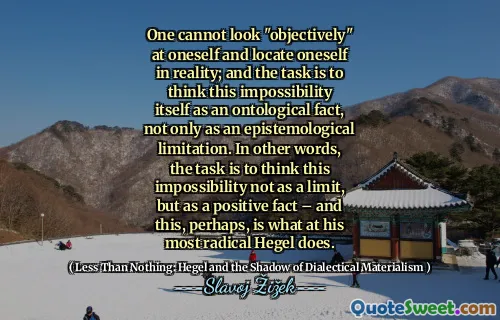"Less Than Nothing: Hegel and the Shadow of Dialectical Materialism" is a crucial work by philosopher Slavoj Žižek that delves into the complexities of Hegel’s philosophy and its relation to dialectical materialism. Žižek presents an innovative interpretation of Hegel, arguing that his ideas can illuminate contemporary issues in philosophy, politics, and ideology. By examining the contradictions within Hegel's work, Žižek seeks to demonstrate how these can be applied to critique modern society and its structures.
The book positions Hegel's dialectics as a vital framework for understanding material conditions and human experience. Žižek contends that Hegel’s concepts, especially the notion of the "negation of the negation," are essential for grappling with the intricacies of dialectical materialism. He emphasizes Hegel’s relevance in today's philosophical discourse and how his insights can be used to confront modern capitalist ideologies.
Ultimately, "Less Than Nothing" serves as both a rigorous philosophical treatise and a critique of contemporary thought. Žižek challenges readers to confront their assumptions about reality, politics, and ideology through the lens of Hegelian thought. His work invites a reevaluation of the role of dialectics in understanding new socio-political landscapes, making it a significant contribution to both Hegelian scholarship and dialectical materialism.
More »
Today Birthdays
1970 -
Shonda Rhimes
1599 -
Edmund Spenser
1940 -
Edmund White
1957 -
Lorrie Moore
1691 -
George Fox
1961 -
Wayne Coyne
1934 -
Carolyn See
1965 -
Bill Bailey
1967 -
Masha Gessen
1937 -
George Reisman
1890 -
Elmer Davis
1978 -
Nate Silver
1884 -
Sophie Tucker
1960 -
Matthew Bourne
1980 -
Maria de Villota
1977 -
Orlando Bloom
1976 -
Michael Pena
1952 -
Geoffrey Canada
1951 -
Frank Peretti
1955 -
Trevor Rabin
1808 -
Salmon P. Chase
1947 -
Robert Martin
1927 -
Sydney Brenner
1926 -
Carolyn Gold Heilbrun
1954 -
Denise Morrison
1960 -
Eric Betzig
1968 -
Traci Bingham
1919 -
Robert Stack
1970 -
Keith Coogan
1989 -
Beau Mirchoff
